#Linguistic nuances
Text
Efficient English to Canadian french Translation Services Available 24/7
Unlocking the Fascinating World of Canadian French Translation
Are you an English speaker curious about the unique nuances of Canadian French? Or perhaps you’re a French speaker wondering how the Canadian variety differs from other dialects? This article will get into the intriguing realm of translating between English and Canadian French, uncovering its linguistic richness and the challenges it…

View On WordPress
#Canadian French#Communication#cultural sensitivity#English to Canadian French#French dialects#language#Language Barriers#LanguageXS#Linguistic Diversity#linguistic nuances#professional translation services#Translation
0 notes
Text
Day 12 of Translating the Hyakunin Isshu: Sōjō Henjō, of the 36 Poetry Immortals of Japan
Twitter
Patreon
GitHub
LinkedIn
YouTube
Welcome to Day 12 of our poetic journey through the Hyakunin Isshu. Today, we delve into the fascinating world of the poet Sōjō Henjō (僧正遍昭). Renowned for his contributions to Japanese literature during the early Heian period, Henjō’s poetry showcases his deep connection to nature and the human experience.
In this beautiful poem, Henjō paints a vivid…
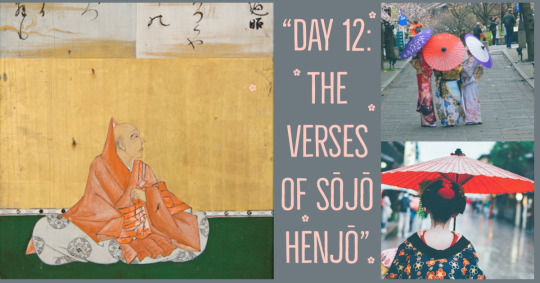
View On WordPress
#Ancient verses#Art of Translation#Bridging cultures#Buddhist monks#Classical Japanese literature#Cross-cultural exchange#Cultural adaptation#Cultural significance#Heian period#Japanese cultural heritage#japanese history#Japanese literary tradition#Japanese philosophy#japanese poetry#Japanese poets#Language and Culture#Language Artistry#Linguistic nuances#Literary craftsmanship#Literary exploration#Literary preservation#Localization theory#Multilingualism#Poetic expressions#Poetry appreciation#Sōjō Henjō#Transcreation#Translating ancient poems#Translation challenge#Translators’ community
2 notes
·
View notes
Text



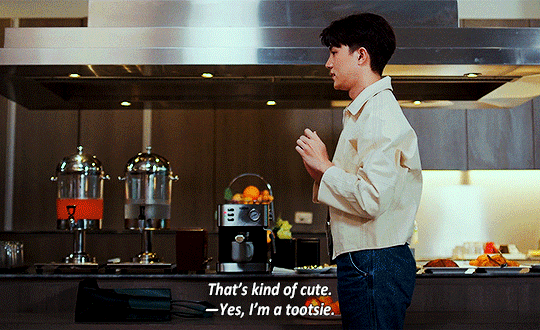


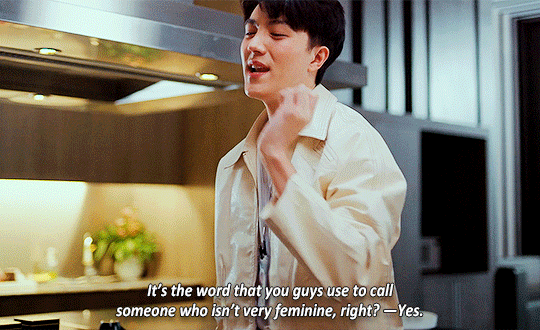
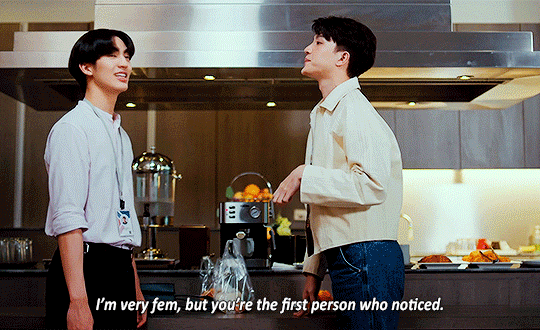

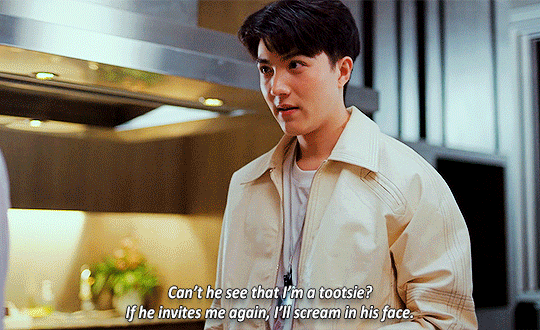
A few notes on Pat and Chot's conversation:
🔹Ke (เกย์) is a neutral expression that is the phonetic adaptation of the English word gay.
🔹Tut (ตุ๊ด) is a vulgar and pejorative expression used to refer to a very effeminate homosexual man and can have multiple translations, as sissy, queen, [or in this case: tootsie] etc.
🔹Je (เจ๊) is a Thai honorific from 姐 for “elder sister”. Chot uses it to refer to himself. Pat later uses it to address Chot.
🔹krap/kha (ครับ / ค่ะ) are gender-oriented particles. Chot uses the traditionally female particle for himself.
🌈Sources: LGTBIQ+ Enciclopaedia, Thaipod101
#step by step#step by step the series#bruce sirikorn#ben bunyapol#stepbystepedit#thai bl#thai drama#bl drama#bl series#my edits.#i added some notes and explanations that imo make this conversation easier to understand#because a lot of the nuances are lost in translation#which isn't the translator's fault - it's just how language works#i love it so much#and i love bruce#and we need more fem gays in bl#who are allowed to be loud and proud and are celebrated for it#Tud/tut might come from the movies Tootsie but I'm not sure#(false friends are a super common thing in linguistics and i haven't checked the word's etymology)#it's a term that chot has very obviously reclaimed for himself
812 notes
·
View notes
Note
btw, any update on shiver's japanese personal pronouns now that the full game is out? theres a tweet going around saying she uses both uchi and onore and that it's a feminine+masculine combo, i wanted to double check and see if that is actually the case or if onore is a common pronoun for women to use? people are getting really militant abt this for no reason (unsurprisingly)
I think I've seen that tweet, yeah, and it's wrong.
So to start this off so everyone knows what’s up: I’m a native Japanese speaker, and I’m nonbinary myself. I’m approaching this topic as someone who WOULD LOVE to have canon, intended, Cisn’t rep here.
However, the situation in regards to Shiver is just a misunderstanding of the... complexities and nuance (?) that comes with the myriad of ways people can refer to themself in Japanese, and there’s actually nothing being censored by NoA when they confirmed that she is intended to be female. As of me writing this (September 17th 2022), there has been no content in the Japanese dialogue that ever suggests that Shiver might be intended to be nonbinary or otherwise some flavor of Not Female.
Before I even get into pronouns I gotta point out that her Japanese name is Fuuka, which is a regular ass girl's name in real life (albeit it's also being used as a shark pun). I think that if they were going to put a canon nonbinary character in Splatoon they're going to be more obvious about it.
Anyhow, with regards to The Question: the instance that Shiver uses "onore" is actually in the Rock Paper Scissors splatfest dialogue, right here:

おのれの魂をコブシに宿し、天につき出すその姿... 勝者のポーズゆうたらコレや!
I always have a hard time doing my own translations because my brain gets caught up on a million different things, but one way I'd write this to try to get across how she's using "onore" as is this:
"Placing one’s soul into one’s fist, raising it towards the heavens... That's the pose of victory!"
It's true that "Onore" has seen some historical use as a personal pronoun, but it's an archaic kind of usage in standard Japanese. It's not actually necessarily masculine either. Now, it does still see relatively common usage in various dialects in western regions, but mostly in the second person. I don't think I've ever heard "Onore" being used as a personal pronoun in the way you'd use stuff like "Watashi" or "Boku" (which is the kind of usage it's being confused with in that tweet) these days, even when writing fictional character dialogue.
That's irrelevant here, however, because that's not how it's being used here! It's being used to refer to a generalized "self" for theatrical effect, and not even as a personal identifier really. I'd say in this case a similar comparison in English would be "oneself" - kinda formal, depending on how you use it it might also be including the speaker, but not explicitly Just The Speaker. Does that make sense?
The like... connotations and perceptions surrounding how one chooses to refer to themself in Japanese is really complicated and context dependent and I DO understand how it might be easy to get confused! I can also see how people learning Japanese as a second language might have extra trouble with Shiver's dialogue in general since she speaks in the Kyoto dialect instead of standard Japanese. Shit's hard! Anyways unfortunately this has been once again a misunderstanding sorry everyone. We can do other things in headcanons, but we can't be going after people or the translators for this.
...
On the subject of personal pronouns though FRYE uses "washi" which has been fun because that is not something typically used by young people! In dialects where it's still common for young people to use "Washi", it tends to be more commonly used by guys, but the more common association is with Old People. Frye in general just speaks like a stereotypical Old Person though I love her she's great. Where's the fucking Frye crowd at
#asks#theyrezi#splatoon 3#splatoon#Shiver splatoon#Deep Cut#i had an hour long discussion with my mom mulling over how complicated and nuanced this shit is and how we kinda take it for granted#bc we have an intuitive understanding of The Connotations... but how do you explain that to people outside of our culture and language?#shit's hard! i aint a linguist! i don't have all the academic tools to ''properly'' dissect and communicate this shit#i keep trying to backpedal to downplay the nuance of The Pronouns Shit but every time i try 2 actually explain it i Remember#Squid 2 the evolution of the squid#dedcourse 2
1K notes
·
View notes
Text
I'm curious.
if u want, tag this with whether you're a native speaker of English (im not!)
#polls#linguistics#english language#english#langblr#jsyk i have some Opinions on this same question in German#but English has like. different nuances.#native speakers and learners please chime in for this im interested#personally i feel like there is a difference but i wouldn't be able to describe it#is there a difference in which context they're used for? is there a difference in the feelings they evoke?#pls tell me#i need a tag for my own rambles
158 notes
·
View notes
Text
I like EVIL conlangs like Klingon and Black Speech and how they all agree that fricatives and glottal sounds are the most EVIL consonants
"Francais" SO EVIL
#evil#linguistics#phonology#phonetics#conlang#also apparently Black Speech is evil because it specifically has no grammar and consists entirely of commands so im just imagining sauron#like a a caveman “YOU SAURON TELL RING WHERE NOW” but he literally doesn't have any adjectives to specify which ring#because ut also specifically has no nuance and thats why the ring was lost for so long
28 notes
·
View notes
Text
i know i'm getting old everytime my computer talks to me about "apps" and not programs. apps are for mobile gtfo
#'now also available as an app' used to mean 'get this on your PHONE'#now everything is an app and it nonsensically became a synonym to program#we already had a word why are we inventing a new one and destroy linguistic nuance while at it???#language
7 notes
·
View notes
Text
I looove being pedantic it's like my favorite past time honestly half the reason I learn new things is so I can correct people who make minor errors in language later on
#this is not a joke except for that it is also a joke dkbdksgjs#sometimes i see people be like 'we need to repeal x supreme court case' and my heart beats a little faster#bc i get to say well TECHNICALLY-#stuff like that#i just love to know linguistical nuances
17 notes
·
View notes
Text
Exploring the Depth of Hindi Language: The Significance of a HindwiDictionary
The Hindi language, with its roots in ancient Sanskrit, is a tapestry of history, culture, and tradition. Its vocabulary is a reflection of India's diverse landscapes, religions, and influences. To truly appreciate and understand Hindi, one must delve into the vast ocean of words and meanings that make up its lexicon. This is where a Hindi dictionary, or "Hindi Shabadkosh," plays a vital role.A Hindwidictionary serves as a linguistic guide, offering meanings, translations, and insights into the rich tapestry of Hindi words. It is a compendium of knowledge, capturing the essence of Hindi expressions, idioms, and phrases. Whether you are a student, a language enthusiast, or someone looking to communicate effectively in Hindi, a Hindi dictionary is an indispensable tool.
Within the pages of a Hindi dictionary, you embark on a journey through the intricate web of nouns (Sangya), verbs (Kriya), adjectives (Visheshan), adverbs (Kriya Visheshan), pronouns (Sarvnam), prepositions (Sambandhbodhak), conjunctions (Samanarthak), and interjections (Avyay). Each word, carefully defined and explained, reveals its unique significance and contributes to the kaleidoscope of Hindi language.The Hindi Shabadkosh not only assists in deciphering Hindi words, but it also provides translations from English to Hindi and vice versa. It serves as a bridge between two languages, helping learners and language enthusiasts to communicate effectively and accurately. Moreover, it uncovers the idiomatic expressions, proverbs, and commonly used phrases in Hindi, offering deeper insights into the language's cultural nuances.
Beyond its practical use, a Hindi dictionary is a gateway to exploring the language's vibrant literary and artistic heritage. It unravels the hidden meanings in Hindi literature, poetry, and songs, allowing readers to appreciate the nuances and imagery crafted by Hindi words. Furthermore, it acts as a window into the world of Bollywood, where Hindi cinema weaves magic through its dialogues and lyrics.
In conclusion, a Hindi dictionary is a treasure trove that unlocks the beauty and intricacies of the Hindi language. It goes beyond mere translations, enabling learners and enthusiasts to immerse themselves in the cultural nuances and profound expressions that Hindi has to offer. So, embark on this linguistic adventure, discover the power of words, and let the Hindi Shabadkosh be your trusted companion in unraveling the depths of Hindi language.
#Hindi dictionary#Hindi Shabadkosh#Hindi vocabulary#Hindi meaning#English translation#cultural nuances#linguistic treasure trove#Hindi expressions#idioms#Bollywood#language enthusiasts.
3 notes
·
View notes
Text
every day i tell these kids to drøft and then i show them how to drøft and then they dont drøft
#drøft is like discuss but there’s nuance still remember when my american theories in linguistics prof#told us to ‘discuss’ in the exam and what he wanted was NOT drøfting but diskusjon#sometimes drøfting and discussion r the same sometimes not#usually they’re the same. most of the time BUT because we dont use ‘diskusjon’ to mean the same the kids suffer#tobari liveblogging
2 notes
·
View notes
Text
Day 9 of Translating the Hyakunin Isshu: Revisiting Ono no Komachi
Welcome back, dear readers, to Day 9 of the 100 Day Hyakunin Isshu Translation Challenge! Today, we have the pleasure of rediscovering the mesmerizing verses of the renowned poet, Ono no Komachi. As we dive deeper into her work, let’s likewise further examine the fascinating life and enduring influence of this remarkable woman.
Ono no Komachi, a prominent figure of the Heian period, captivated…

View On WordPress
#Ancient verses#Artistic beauty#Classical literature#creative inspiration#Cultural Heritage#Emotional Depth#Evocative imagery#Expressive language#Female poets#Feminine perspective#Heian period#Human experience#Introspection#Japanese aesthetics#japanese literature#japanese poetry#Language and Culture#Linguistic nuances#Literary craftsmanship#Literary exploration#Love poems#Ono no Komachi#Poetic expression#Poetic resonance#Poetic traditions#Poetry analysis#Symbolism#Timeless themes#Translation challenge#Waka poetry
1 note
·
View note
Text
just saw a "leftist" reddit take thats abt to make me delete the app
#i just want news and twitter screenshots and baking pics and linguistics jokes#but oh boy this post is actually infecting my bloodstream#taking a real life nuanced leftist take and converting it into some BULLSHIT using full on right-wing language and buzz worss#words*#its driving me batty#txt
3 notes
·
View notes
Text
im going down a google rabbit hole of linguistics help
#the breadth of different linguistic nuances between different languages intimidates fascinates terrifies and awes me in equal measure#it's lovely#linguistics#langblr#language learning#learning languages#languages#random rambling
5 notes
·
View notes
Text
This website is so fucking stupid lmao
#biting my tongue bc it would be a Bad Look to pick certain hills to die on#but I’m so fucking tired of the way peoples understanding of language and linguistics and what is and is not appropriate never goes beyond#discourse posts on tumblr dot com#language did not begin in 2014#Karl marx was not appropriating Migos when he wrote about the Bourgeoisie#benvolio was not committing a microaggression by calling Romeo Cousin all the time#gonna delete later because it’s No Nuance Wednesday every day apparently
3 notes
·
View notes
Note
Kinda a fucked up question maybe but do you think people can be in qpr's with siblings? My ex and is qpr was very,, intense and I don't see myself creating a connection like that with someone I'm related to, and it felt different than my romantic relationships, but I'm also like,, ?? Would others define it differently ?? Yk actually the more I think ab it,, nvm that was a silly question
this ask bemuses me. i literally don't care what other people do or what words they use to describe their relationships to partners, friends, & family. this is one of those scenarios where you simply must go "i'll do whatever works for me, other people do whatever works for them" and then cease to have the question take up ur valuable energy. it will save you SO much mental time. be free
#i mean this kindly btw i'm not upset#i'm just not gonna waste my energy thinking through whatever nuances i'm supposed to be thinking through here#ESPECIALLY about qprs which by definition are undefinable and vary wildly in boundaries/shape from person to person#this is presumably about the luz and hunter post#so i guess the only clarification i'd make about that is i'll probably never write them considering each other sister/brother textually#bc that's not how i see them. but i get how and why other people have arrived at the sibling conclusion instead#different words to describe the same dynamic. different cultural/fandom experiences n contexts. linguistics. etc#replies
7 notes
·
View notes
Text
sorry this is extremely out of nowhere but i just remembered my roommate telling me that in taiwanese circles wei wuxian’s nickname is wifi
#modaozushi#laughs awkwardly#wuxian is a pun on wireless is the reason. imagine being Assigned Wife At Translation#etc etc insert spiel about nuanced issues with regards to fandoms consuming translated content#sometimes the complexity/linguistic references are hard to explain. but puns are fun AND easy :D
2 notes
·
View notes